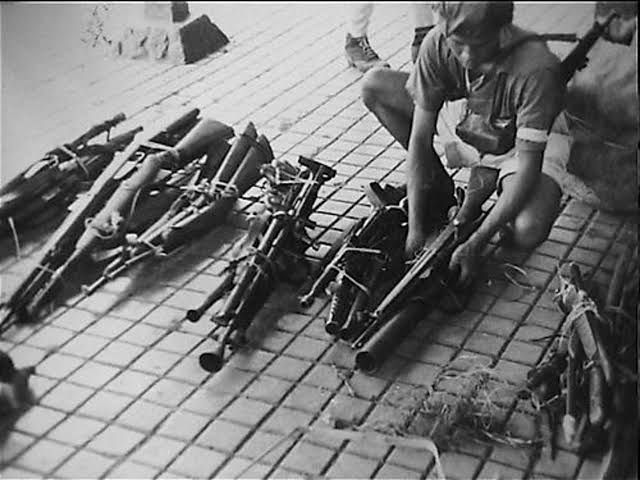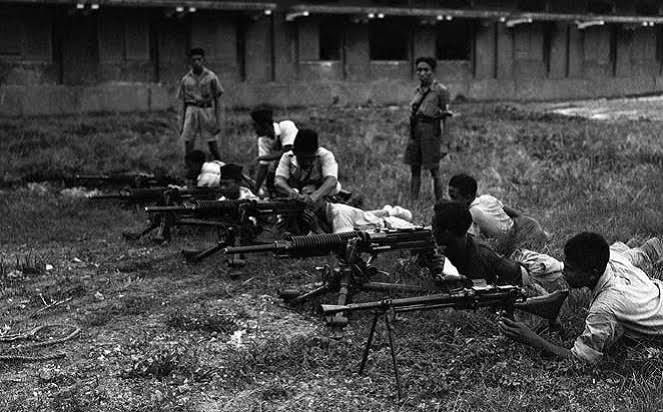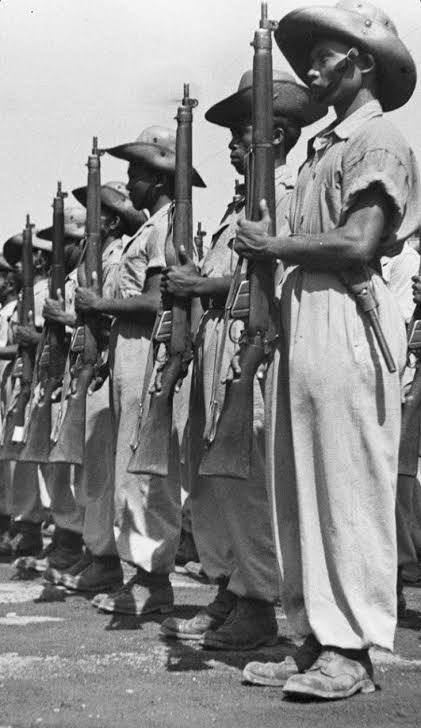
The cold held the city of Malang that night. Barking sogs , raised a spooky atmosphere. The clock needle almost pointed to 12, when Ishak (not his real name) who was fast asleep was awakened by the team commander and a friend. Even though he felt lazy, the teenager's soldier was forced to get up from his compound in the form of rombing mats. He was then ordered to get ready. Ten minutes later, the three of them had walked into a secret place.
Right before the morning prayer time, the three TRIP (Army of the Republic Indonesia Students) had arrived in the Pakisaji region. They then entered a hut and waited. Approximately five minutes later, the light appeared from a small flashlight. Without a lot of talking, the commander put out the red money (money issued by the Dutch East Indies Government) then handed it to one of the Dutch soldiers.
After counting the numbers, one of the Dutch soldiers signaled his friend to put down their luggage which was wrapped in black cloth. Once opened, it turned out that the two objects wrapped in cloth were two weapons.
"One type of Lee Enfield, another type of Brengun," said the former member of TRIP (Army of the Republic of Indonesia Students). The 'unlawful' business was running smoothly.

Isaac's story was not just a figment. Around 1946-1948, the business of selling firearms illegally was rife in the Malang area. In Sangkur and Pena, Asmadi (a writer and historical actor) even mentioned the price range for weapons in white money (money issued by the Indonesian government): Two Hundred and Fifty Rupiahs for a Brengun and One Hundred Rupiah for a Lee Enfield.
Uniquely, said Asmadi, the firearms business did not only involve brown-skinned Dutch soldiers, but also Caucasian soldiers. Usually they became the leader who managed the sales flow.
"To be more secure, transactions were often also paid for with raw goods such as coffee, tobacco, tea, quinine and others," said the author, who is a former member of TRIP Malang.
After the Renville Agreement was agreed by the Indonesian and Dutch parties, the illegal firearms business was even more fertile and seemed 'legal'. In Malang, the route of the smuggled weapons started from the Dutch military posts in Malang, then flowed through the Malang-Kepanjen highway. By train, the goods were transported to Kepanjen. Arriving there and then transferred to military trucks that were obliged to carry it to the demarcation line.
At the agreed point, the two parties, who were actually enemies, met in a friendly atmosphere.
"The hostility has completely disappeared and the atmosphere has become full of friendship because both parties can keep their respective promises..." Asmadi wrote.

Robert B. Cribb confirmed the existence of the 'unlawful' business. In Gangters and Revolutionaries: The Jakarta People's Militia and the Indonesian Revolution 1945-1949, Cribb stated that arms smuggling had occurred since British troops entered Indonesian territories in 1945-1946. In collaboration with local bandits and the Indonesian Civilian Police (which was under the coordination of the British army), the British army carried on the business almost without interruption.
Apart from coming from the British army itself, the weapons were mostly looted from the Japanese soldiers stored in Singapore. From the warehouses at the port, the killing tools were then transported to Batavia via military transports. Arriving at Tanjungpriok Port, then the firearms changed hands to the Republican side through the women of Pasar Senen commercial sex workers.
"Black world connections were also important in the arms trade chain because they were directly responsible for the flow of the weapons to the buyer," said the Australian historian.
After the last British troops left in December 1946, this profit-making tradition was actually carried on by their colleagues in the Dutch military who wanted just 'extra money' for fun. Pasar Atom was a favorite place to make transactions, apart from the city borders that were included in the suburbs of Jakarta such as Bekasi and Karawang.
In other places, such as in Sumatra, the transaction took the form of bartering goods: firearms were exchanged for opium. This was similar to what was done in 1948 by Young Lieutenant Sho Bun Seng, a member of the Indonesian National Army (TNI) from the Singa Pasar Usang unit in Padang, West Sumatra.
"We sold these illicit goods at high prices in Singapore, but not infrequently they werere immediately exchanged for weapons and ammunition…" recalled the man who was in his old age in northern Jakarta.
** Your post has been upvoted (11.20 %) **
Curation Trail is Open!
Join Trail Here
Delegate more BP for bigger Upvote + Daily BLURT 😉
Delegate BP Here
Upvote
https://blurtblock.herokuapp.com/blurt/upvote
Thank you 🙂 @tomoyan